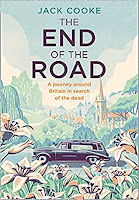Still very behind with book reviews so this is another quick catch-up post.
First up, A Quiet Month in the Country by T.E. Kinsey. This is my 6th. book for Marg's Historical Fiction challenge.
It's 1908 and Lady Hardcastle and her maid, Florence Armstrong, have retired to the countryside. They have purportedly lived quite a colourful life: you get hints as the book goes along of them being stranded in China and having to make their way to India on their own. Anyway, they think they're moving to get a quiet life but naturally it doesn't work out that way after they find a body hanging from a tree in the woods. They get involved in the investigation and Inspector Sunderland, the officer in charge, is content to let them help solve this mystery involving murder, missing jewels, engagements and even cricket. This was a light, fun read which I enjoyed more for the banter between the two women than anything else. It's clear their relationship is not the traditional employer/maid one as they've been through an awful lot together. Lady Hardcastle is nothing if not eccentric and Florence is into martial arts so that makes the whole thing even more intriguing and I plan to read on in the series to find out more about these two women.
Next, Above the Bay of Angels by Rhys Bowen. This is my 7th. book for Marg's Historical Fiction challenge.
Isabella Waverly is witness to a road accident on the streets of London and the young woman involved dies as Bella tries to comfort her. In her hand the woman is holding a letter which Bella reads and sees is a letter of introduction to the kitchens of Buckingham Palace. The dead woman, Helen Barton, was about to take up a position as an under cook there. Unhappy in her own position as a cook in another household, Bella decides to become Helen and thus begins quite an adventure. It eventually sees her in the south of France, learning the secrets of French cuisine from the head chef of Queen Victoria's custom-built hotel in Nice. It also sees her desperate to keep the secret of her real identity, that of a daughter to an aristocratic father who lost everything due to alcohol and who, penniless, had to go into service. And then one of the royal family's German relations is poisoned and things become even more complicated than they already are because Bella is now one of the suspects. This is my first book by popular author, Rhys Bowen. I found it very readable, if slightly far-fetched, but that didn't spoil my enjoyment at all. I loved the setting of the French Riviera, Queen Victoria was well drawn and all of the details of her household were as I have read from non-fiction books. I loved the descriptions of the huge meals and how they were prepared - no expense spared! There was enough in the way of intrigue and secrets to keep me happy and all in all I enjoyed this one very much.
Lastly a non-fiction book, Faring to France on a Shoe by Val Poore.
It's 2008 and the author, Valerie Poore and her partner, Koos, who live in Rotterdam, buy a secondhand barge. I can't remember now whether they named it the Hennie-Ha, or it was already called that, whatever... Unfortunately it turns out to be in not quite the good nick they thought and they sort of put it to one side and forget about it. Eventually the problems are fixed and in 2016 they decide on a trip, they go 'faring to France on a shoe'... 'shoe' because that's what a bystander shouted out one day as they went past, referring to the appearance of the boat. Anyway, they set out from Rotterdam, travelled across Belgium and into France heading for Cambrai, a town in the Hauts de France region of Northern France (just south of Lille). It's not an area you read much about in books that deal with France, Provence, Brittany, the Dordogne, yes, but not northern France. So it was a real pleasure to read something a bit different and I love books about people travelling on canals, so this was right up my street. Val is a super writer (I've read her Watery Ways so I knew that already) and it was sheer joy to accompany her and Koos as they meandered along so many different canals and through so many towns to reach their destination. I'm full of admiration for her can-do attitude too. She admitted to being terrified of the gaps between the barge and the sides of the locks, and the subsequent climb to the canal-side. I'm not surprised, so would I be! But she grits her teeth and gets on with it. She often found herself cycling for miles to pick up supplies and one story of how she did it in searing heat on a bike with a serial flat tyre astonished me. This a delightful read. Such gorgeous descriptions of the peace and tranquility of their journey and the cameraderie with the people they meet on the canal. And when they turned for home and she felt sad, I did too, quite bereft to be honest and that really is a sign of good writing. I look forward to reading more of Val's lovely books... in fact she has a sequel to this book, Faring Forth Again on the Shoe, newly released. I shall be reading it.I wish I could say that brings me up to date but it doesn't. So, more soon!







